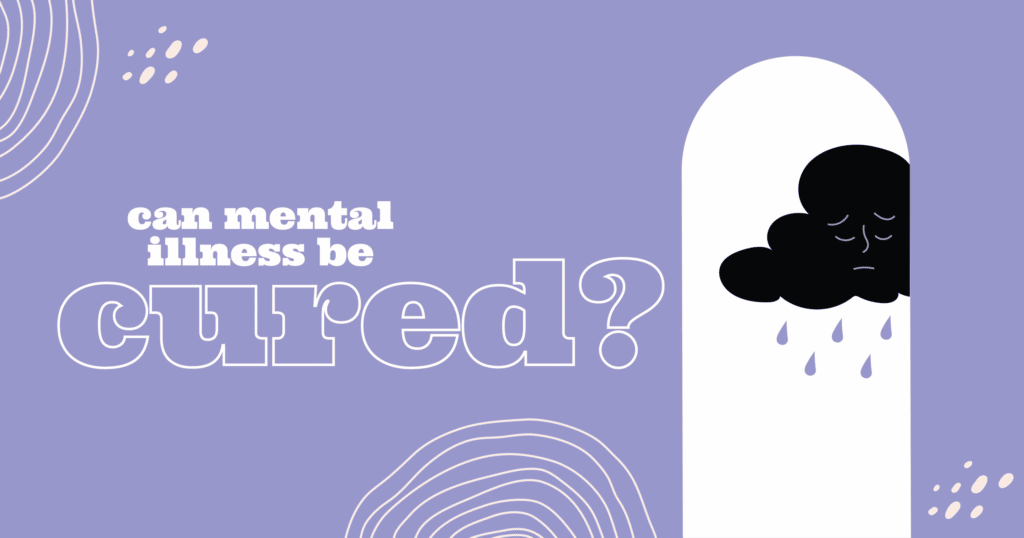Can mental illness be cured? This is a common question we hear all the time, and it’s a complicated answer. The complex aspect is because there are treatments for mental illness, but not necessarily cures.
The good news is that while we don’t medically say mental health conditions are cured when treated, and your symptoms are under control, you can feel great and have a good quality of life.
Cure vs. Treatment
When you talk about a cure for an illness, it’s gone forever. There aren’t cures for some illnesses. Chronic illnesses are an example.
Diabetes is a chronic illness with treatments to help symptoms disappear even if not medically cured.
Mental illness is similar. You can recover and be in remission from your symptoms, living a healthy, long life with an effective treatment plan.
Mental Health Center of San Diego
Understanding Mental Disorders
A mental disorder or a mental illness affects how you think, feel and behave. Mental health disorders affect your behavior, and they are usually chronic, meaning long-lasting. When your mental illness isn’t treated, it affects your functionality in your daily life and how you relate to other people.
Many factors can play a role in the development of mental disorders. These factors include:
- Genetics and family history
- Life experiences like trauma or abuse
- Chemical imbalances in your brain and other biological factors
- Traumatic brain injury
- Exposure to viruses or toxic chemicals during pregnancy
- Using alcohol or recreational drugs
- Having a serious medical condition
- Social isolation or loneliness
More than half of everyone in America will be diagnosed with a mental disorder at some point in their life.
What Are the Most Common Mental Health Disorders?
Some of the most common general types of mental health disorders include:
- Anxiety disorders: You may respond to certain situations with dread or fear when you have anxiety symptoms. You can have physical symptoms like sweating, muscle tension, or a rapid heartbeat. If your response is out of proportion to the actual situation, you may have an anxiety disorder. An anxiety diagnosis requires that it’s interfering with your daily activities. Specific types of anxiety include generalized anxiety disorder, social anxiety disorder, panic disorder, and phobias.
- Mood disorders: These are also known as affective disorders. When you have a mood disorder you may have ongoing, consistent feelings of sadness or extreme fluctuations in your mood. Common mood disorders are depressive disorder and bipolar disorder.
- Psychotic disorder: Psychotic episodes include distorted thinking and awareness characterize psychotic disorders. Two common symptoms of a psychotic disorder are hallucinations and delusions. Hallucinations are when you experience sounds or images that aren’t real. Delusions are when someone has false beliefs but believes them to be true. Schizophrenia is a psychotic disorder often with severe symptoms. Antipsychotic drugs can help manage these symptoms.
- Eating disorders: If you have an eating disorder, you may have extreme attitudes and emotions surrounding food and weight. Common eating disorders are anorexia nervosa, bulimia nervosa, and binge eating disorder. Eating disorders are mental health disorders that can severely impact physical health simultaneously.
- Impulse control and addiction: If you have an impulse control disorder like pyromania, you can’t resist your urges to do certain things. Gambling is another example of an impulse control disorder. Addictions are substance use disorders involving drugs or alcohol affecting daily living.
- Personality disorders: If you have a personality disorder, you have extreme traits that aren’t flexible and distressing to you. This creates problems in your daily life according to the American Psychological Association. Your thinking and behavior patterns differ from social norms with a personality disorder. Examples include obsessive-compulsive personality disorder, antisocial personality disorder and borderline personality disorder.
- Post-traumatic stress disorder: Posttraumatic stress disorder (PTSD) affects people following exposure to something terrifying or life-threatening. Negative symptoms and adverse effects can occur because of that event or exposure.
- Obsessive-compulsive disorder: If you have OCD, mental health symptoms may include ongoing thoughts or fears that lead to performing routines or rituals. Disturbing thoughts in this context are called obsessions. Rituals are compulsions that negatively affect daily functioning.
Recovering from Mental Health Problems
While the answer to “can mental illness be cured” is technically no, you can recover, and many people do. Your symptoms could come back occasionally. If they do, you may have symptom management mental illness activities and coping mechanisms you fall back on.
When you learn strategies and coping mechanisms, you can turn to them to get symptoms under control quickly before they have the chance to become worse.
Recovery in mental health means that you improve your health and wellness. You live a self-directed life, and you work to achieve your potential.
The dimensions of recovery from a mental health disorder or a substance use disorder include health, home, purpose, and community.
Mental Health Center of San Diego
Can Mental Illness Go Away On Its Own?
Mental illness affects every person differently. For some people, symptoms are constant. For others, they come and go. You may have a single episode of a mental health disorder, or it could be something you deal with throughout your life.
You can also have symptoms of one mental health disorder or multiple disorders.
We can’t predict how your mental illness will occur, but it’s not highly likely it’s going to go away on its own.
Luckily, there are excellent treatment options available.
Psychological Therapies
Psychotherapy is one of the first-line treatments for mental illness or a brain disorder. Psychotherapy is talk therapy. Talk therapy is an excellent, evidence-based way to control symptoms of a mental illness. Participating in therapy can help improve your functionality and overall well-being.
There are a lot of different approaches to therapy. You can go to individual therapy, or you might go to family or couples therapy. Group therapy is also an option.
Your therapy sessions are guided by a professional, and you may do short-term sessions that last for a few weeks, or you could do long-term therapy lasting for months or years.
Cognitive behavior therapy (CBT) is the most common type of talk therapy. When you participate in cognitive behavioral therapy, you learn to identify and then change your harmful thinking and behavior patterns. CBT focuses on solving current problems in your life.
This form of therapy is helpful for mild to severe depression, trauma, anxiety, and eating disorders.
Medication
Medications are not a cure for mental illness, but they help manage symptoms. Medication is an essential part of many psychological treatments.
According to the American Psychiatric Association, the most effective way to achieve recovery when you have a mental health disorder is often through a combination of medication and therapy.
When you take medication, finding the dose that works for you and the specific medicine that’s the right fit can take time. Most mental health providers will start you with a low dose of medication. Then, your dose will slowly go up until your symptoms significantly improve or disappear.
An antidepressant drug can be broadly used to treat depressive episodes and significant depression, and other disorders like anxiety. Doctors may use antipsychotic medications for more severe conditions.
Mental Health Center of San Diego
Other Forms of Treatment
While talk therapy and medication are the gold standards to help treat a mental illness, other options exist too:
- Participation in a support group
- Complementary and alternative therapies
- Creating self-help plans
- Lifestyle changes like getting more physical activity
- Social and peer support
- Hospitalization in severe cases
- Additional therapies like animal-assisted or art therapies
The most important thing you can remember is that your mental illness is treatable. Contact the Mental Health Center of San Diego by calling (858) 258-9883 to learn more about options for treating various mental health disorders.









